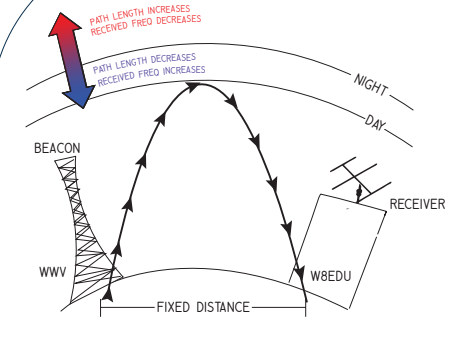June 2021 Eclipse Festival of Frequency Measurement
Calling all stations: Join us for
The June 2021 Arctic Eclipse Festival
Alternate language options:
French: Français
Norwegian: Bokmål
Introduction

Contact information:
Kristina Collins: kd8oxt@case.edu
Research Questions
- This eclipse crosses the auroral oval. When observing Doppler shift, what combined effects do we observe from the aurora and eclipse?
- What properties of the ionosphere are we able to measure by observing the variation in these HF propagation paths?
- What effect will the annular eclipse have on these propagation paths?
- How do various measurement techniques for understanding the path variation compare?
- Is there volunteer interest in collecting data in the regions near totality for this eclipse?
Objectives
- Promote international goodwill by working with citizen scientists around the globe
- Measure Doppler shifts caused by space weather's effects on the ionosphere
- Refine experimental procedures for future eclipse experiments
- Develop digital signal processing for RWM
Times
- Data recording starts: 07 June 2021, 0000 UTC
- Data recording ends: 12 June 2021, 2359 UTC
Please begin measurements before the day's start time and end them after the finish time, if possible.
Beacons
The primary beacon for this experiment will be the Russian time standard station RWM on 9.996 MHz. If you are unable to receive it at your station, please try 10 MHz WWV or another station from this list. Experiment with your radio to see which stations are easiest for you to receive.
How to Participate
1) Sign up on the Eclipse Festival mailing list: https://groups.google.com/g/eclipse-festival
2) Collect data according to the instructions on this page: hamsci.org/doppler-instructions
Use the instructions on collecting audio data in Audacity, not fldigi.
If you collected data for the December 2020 Eclipse Festival, the procedure is very similar, except that the local oscillator frequency must be included in the filename.
3) Submit data here: https://cwru.app.box.com/f/4c75fe21d8f744d980b61916704abd1f
Test Run
There will be an optional practice session on May 30th to select one or more beacon stations for the experiment. To participate, please listen for RWM (4.996 MHz, 9.996 MHz) and WWV (5 MHz, 10 MHz) on your radio and fill out the survey below. It's best to record around the same time of day as the eclipse (8 am UTC). If possible, please make a short recording with Audacity and upload it here.
Media Mentions
RadioUser Magazine, July 2021
